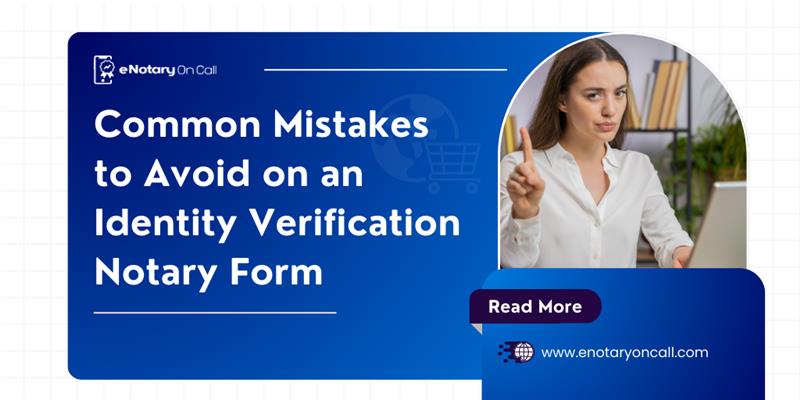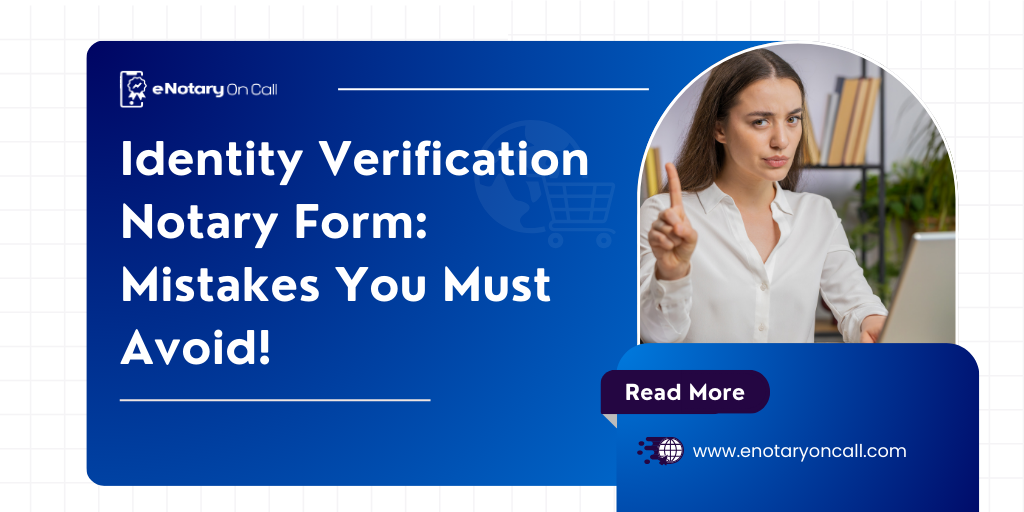Can you notarize your own documents?
If you’ve ever asked these questions, you’re not alone. Many people unknowingly make costly errors when filling out or wanting to notarize the Identity Verification Notary Form, leading to rejected documents, delayed transactions, or even legal trouble.
Whether you’re dealing with Florida Notary Services, following Texas Notary Laws, or scheduling an online notarization session, one small mistake can create big headaches. Let’s explore the most common mistakes and how to avoid them.
But first, let’s quickly discuss,
What is the Identity Verification Notary Form?
An Identity Verification Notary Form is a document that confirms the signer’s identity before a notarial act is performed. It’s an essential safeguard against fraud, ensuring that the person signing is genuinely who they claim to be.
But here’s where people often slip up: incorrect IDs, incomplete information, or a misunderstanding of state-specific notary laws in Texas or California.

Top Mistakes People Make While Signing an Identity Verification Notary Form!
One mistake on an Identity Verification Notary Form can cost you: Here’s What to Avoid!
1. Using Expired or Invalid IDs
One of the most frequent issues is presenting outdated identification. For example, under the State of Texas Notary Laws, the ID must be current, government-issued, and contain a photo and signature.
2. Signing Before Meeting the Notary
A notarized document must be signed in front of the notary, not before. People often sign at home, thinking it saves time. In reality, this invalidates the form.
3. Confusing State Laws
- Notary laws in Texas require a stricter verification process compared to some states.
- An online notary in California requires a state-approved RON platform for remote notarization.
- Remote Online Notarization in Florida is allowed, but the notary must be commissioned in Florida.
Many clients assume notarization rules are uniform everywhere, which isn’t true.
4. Expecting to Notarize Your Own Documents
Here’s a big one. People often ask:
- Can you notarize your own signature?
- As a notary, can you notarize for yourself?
The answer is a clear NO. No notary, whether in Texas, California, or Florida, can notarize their own signature or documents. It’s a conflict of interest.
5. Ignoring Remote Online Options
Many people still spend hours searching for a Florida Notary near them, rather than using a remote online notary platform.
With the best RON platforms like eNotary On Call, you can verify your identity and get documents notarized online, legally recognized in multiple states.
What You Should Do Instead?
- Double-check your Identity Verification Notary Form before meeting a notary.
- Confirm requirements under Texas Notary Laws or notary laws in Texas if you’re filing there.
- Ask yourself – Do I need a traditional notary, or is a remote online notary faster and more secure?
- For convenience, choose a platform like eNotary On Call, offering access to certified notaries in Florida, Texas, and other states.
Also Read – Common Documents That Require Notarization in Florida! Click Here!
Why Choose eNotary On Call for Remote Online Notarization Services?
At eNotary On Call, we simplify notarization across multiple states. Whether you need help with an Identity Verification Notary Form in Texas, California, or Florida, our certified notaries are available 24/7 via secure remote online notarization.
With us, you get:
- Fast, legally compliant services
- Certified notaries familiar with Texas Notary Laws and Florida Notary Services
- Convenience, no more searching for a public notary near me
Conclusion
Mistakes on an Identity Verification Notary Form can cost you time, money, and legal standing.
By understanding notary laws in Texas, the requirements of an online notary in California, and the flexibility of remote online notarization in Florida, you can avoid common errors and get it right the first time.
And if you want the safest, fastest way? Try eNotary On Call, your trusted partner for remote online notary services.
Also Read – Florida Notary Services: What Can and Cannot Be Notarized? Click Here!
FAQs
Q1. Can you notarize your own documents?
No. A notary cannot notarize their own signature or documents under any state law.
Q2. What is a notary?
A notary is a state-appointed official who verifies the identity of signers, witnesses signatures, and prevents fraud.
Q3. Can you notarize a document for the family?
In most states, notarizing for immediate family is discouraged or prohibited because it may create conflicts of interest.
Q4. Can I notarize a document from another state?
Yes, but only if you are physically in the state where you are commissioned. For example, a Florida Notary can notarize your documents for a client in another state via remote online notary, but the notary themselves must be located in Florida.
Q5. How to notarize a document in Texas?
You need to appear before a Texas notary (in person or via remote). Provide a valid ID, sign in front of the notary, and have the notary complete the certificate under the state of Texas notary laws.
Q6. What do I need to get something notarized in Texas?
A valid government-issued ID, the completed Identity Verification Notary Form, and presence (physical or online) before a Texas notary.



